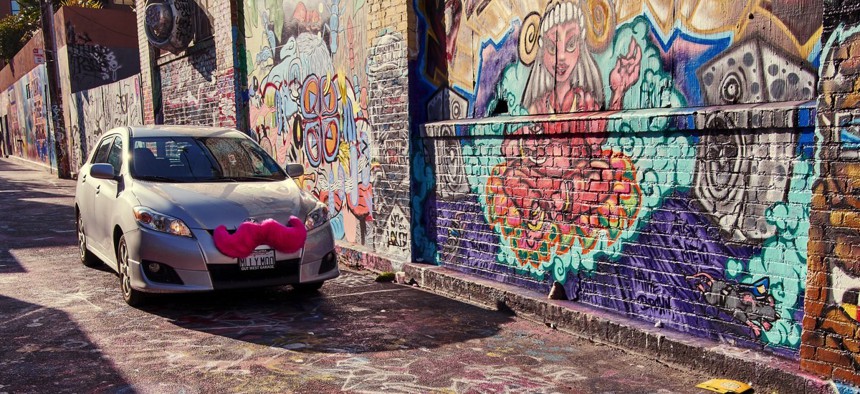Are Ride-Hailing Services Needed in Modern Cities?

A Lyft in San Francisco Kārlis Dambrāns / Flickr.com
Officials in Broward County, Florida, don’t think so.
Ride-hailing services pulled out of Broward County, Florida, last week—unwilling to have their drivers undergo newly required background checks or risk a lawsuit by continuing operations while flouting local regulations.
In April, commissioners of the South Florida county, which is the second-largest in the state by population, passed one of three local laws in all of Florida that legalized Uber and Lyft while mandating their drivers register as chauffeurs, be fingerprinted as part of a criminal background check and carry extra insurance.
This isn’t the first time that San Francisco-based Uber, now worth more than $50 billion, has drawn a line in the sand over local government regulation of transportation options. It has withdrawn from places like San Antonio, which also wanted to fingerprint drivers, and in south Mississippi, where it conflicted with the Harrison County Vehicle for Hire Commission’s rules.
Andrew Vila, Florida state director for nonprofit Generation Opportunity, argues ride-hailing services are critical to revitalizing U.S. cities:
"If policymakers really want to help revive urban areas in South Florida, they should get behind policies that unleash innovation and connect more people with jobs and opportunity. Young people in particular rely on ridesharing services to not only get around affordably, but also to find gainful employment at a time when the youth unemployment rate is nearly 14 percent. Uber and other emerging companies in the ridesharing economy are helping to drive urban economies forward, yet this progress is being stifled by outdated and archaic regulations.”
Broward County commissioners cited public safety concerns in opposing unregulated ride-hailing services.
“As elected officials, we have to ensure that our residents are protected,” Commissioner Mark Kiar told WBFS-TV the day of the vote. “I want to make sure that someone who gets behind the car of an Uber vehicle is not going to assault a resident or a college kid or somebody that gets in the back.”
But safety doesn’t trump fast service for cheap in most riders' minds, a standard that Uber spokesman Bill Gibbons said “onerous regulatory frameworks” compromise, according to the Sun-Sentinel.
More than 2,000 local Uber drivers, who raked in millions of dollars in the last year, lost their jobs, which a few local bars protested with rallies that touted the ride-hailing service as an alternative to drunk driving.
Neighboring Miami-Dade County still supports Uber and Lyft, and several municipalities in the county want to defy the Broward commissioners and continue authorizing ride-hailing services.
"I'm going to fight for it like crazy," dissenting Commissioner Chickie Brandimarte told the Sun-Sentinel. "I want it. I'm mad that our own representatives voted against it."
Dave Nyczepir is News Editor for Government Executive’s Route Fifty.
NEXT STORY: 'Silver Tsunami' Has Cities and States Hiring After Years of Cuts






